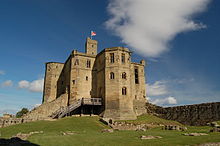Henry Percy, 2nd Earl of Northumberland
Henry Percy, 2nd Earl of Northumberland (3 February 1393 – 22 May 1455) was an English nobleman and military commander in the lead up to the Wars of the Roses.
In the following years, Northumberland occasionally served with the king in France, but his main occupation was the protection of the border to Scotland.
[6] The following years were marked by an itinerant life and further plotting, while the young Henry remained in the custody of the Duke of Albany.
[4] On 19 February 1408, the first earl of Northumberland was killed in the Battle of Bramham Moor, leaving the young Henry Percy as heir apparent to the earldom.
His cause was aided by the king's aunt, Joan Beaufort, Countess of Westmorland, who arranged his marriage to her daughter Eleanor.
[11] At the same time, he was also involved in national political affairs, and acted as steward at the coronation of Henry's queen Catherine on 24 February 1421.
[5] In the council, he seems to have belonged to Bishop Henry Beaufort's social circle, and he followed Beaufort—now cardinal—to peace negotiations at Berwick in 1429.
[12][13] The next year, Richard Neville, Earl of Salisbury, equally exasperated by the lack of royal support, gave up his commission as Warden of the West March.
[19] What triggered the conflict was the marriage between Salisbury's son Thomas and Maud Stanhope, niece and heiress of Lord Cromwell.
[21] At the same time, the Neville-Cromwell wedding had led Huntingdon (now Duke of Exeter) to join the cause of the Percys, because of a territorial dispute with Cromwell.
[22] On 24 August 1453, Thomas attacked the Neville-Cromwell wedding party at Heworth near York with a force of over 700 men.
[5] Instead, the collective forces of the Percy and Neville families gathered at their Yorkshire strongholds of Topcliffe and Sand Hutton, respectively, only a few miles apart.
[24] Both sides had ignored royal commands to disband, and battle seemed inevitable, but eventually a truce ensued and the forces withdrew.
Somerset enjoyed great influence over the king, but after Henry had been incapacitated by mental illness in 1453, York was appointed protector in 1454.
In May 1455, Northumberland was travelling with the king and Somerset to a great council at Leicester, when the party was intercepted by York and the Nevilles.
[5] A suggestion made by a contemporary chronicler, and supported by modern-day historians, said that the true purpose of the battle was to settle personal scores.

